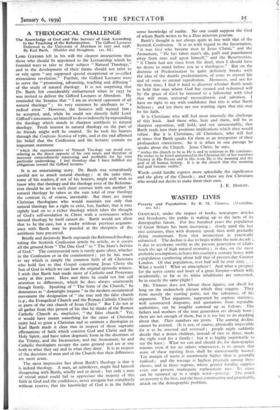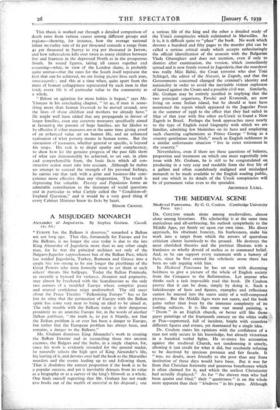WASTED LIVES
GRADUALLY, under the impact of books, newspaper articles and broadcasts, the public is waking up to the facts of its demographic future. For five hundred years the population of Great Britain has been increasing ; slowly until the last two centuries, then with dramatic speed, then with gradually dying momentum. Now that momentum is practically exhausted. The decline is due to begin within the next decade ; is due to accelerate swiftly as the present generation of adults reach the age of high natural mortality ; is due, on the most probable assumptions, to leave this country a century hence with a population numbering about half that of present-day Greater London. Of that population, over half will be over sixty . . . What a world ! What an atmosphere ! And what a prospect for the nerve centre and heart of a great Empire—which will, incidentally, so far as its white inhabitants are concerned, be in exactly the same plight !
Mr. Titmuss does not labour these figures, nor dwell for long on the melancholy picture which they suggest. They form merely the starting point, not the substance, of his argument. That argument, supported by copious statistics, well constructed diagrams, and quotations from reputable authorities, can be roughly summed up as follows. The fathers and mothers of the next generation are already born ; there are not enough of them, but it is too late to do anything about that. Their numbers are given. The coming decline cannot be averted. (It is not, of course, physically impossible for it to be arrested and reversed ; people might suddenly decide that a dozen children, instead of two or three, made the right total for a family ; but it is highly imprnbable to say the least.) What we can and should do, for demographic reasons even if for no others whatsoever, is to ensure that none of these existing lives shall be unnecessarily wasted. The margin of waste is enormously higher than is generally realised ; and the wastage is highest precisely among those classes, and in those regions, whose greater fertility supplies even our present inadequate replacement rate. Its cause can be summed up in a single word-;-poverty. The attack on poverty is the first, and the most constructive and practicable, attack on the demographic problem.
This thesis is worked out through a detailed comparison of death rates from various causes among different groups and regions—showing, for instance, how the average national infant mortality rate of 62 per thousand conceals a range from 41 per thousand in Surrey to 114 per thousand in Jarrow, and how tuberculosis kills over twice as many children between five and fourteen in the depressed North as in the prosperous South. In round figures, taking all causes together and assuming—what, in view of the London slums, is probably quite untrue—that the rates for the South itself represent the best that can be achieved, we are losing 50,000 lives each year, unnecessarily ; and this at a time when, quite apart from the mass of human unhappiness represented by each item in that total, every life is of particular value to the community as a whole.
" Before an agitation for more babies is begun," says Mr. Titmuss in his concluding chapter, " let us, if man is some- thing more than human livestock to be moved around, save the lives of those children and mothers we already have." He might well have added that any propaganda in favour of larger families, even any concrete measures specifically aimed at favourir g the parents of large families, are far likelier to be effective if other measures are at the same time giving proof of an enhanced value set on human life, and an enhanced realisation of what poverty means in human terms. But the discussion of measures, whether general or specific, is beyond his scope. His task is to dispel apathy and complacency, to show how far the genuine progress of the past falls short of what can demonstrably be achieved, to set out, in plain and comprehensible form, the basic facts which all con- structive action must take into account. Although he makes no attempt to conceal the strength of his personal feelings, he carries out that task with a grim and business-like com- petence more effective than any vituperation. The result is depressing but valuable. Poverty and Population forms an admirable contribution to the literature of social questions and in particular to what Carlyle called the " Condition-of- England Question," and it would be a very good thing if every Cabinet Minister knew its facts by heart.
HONOR CROOME.











































 Previous page
Previous page